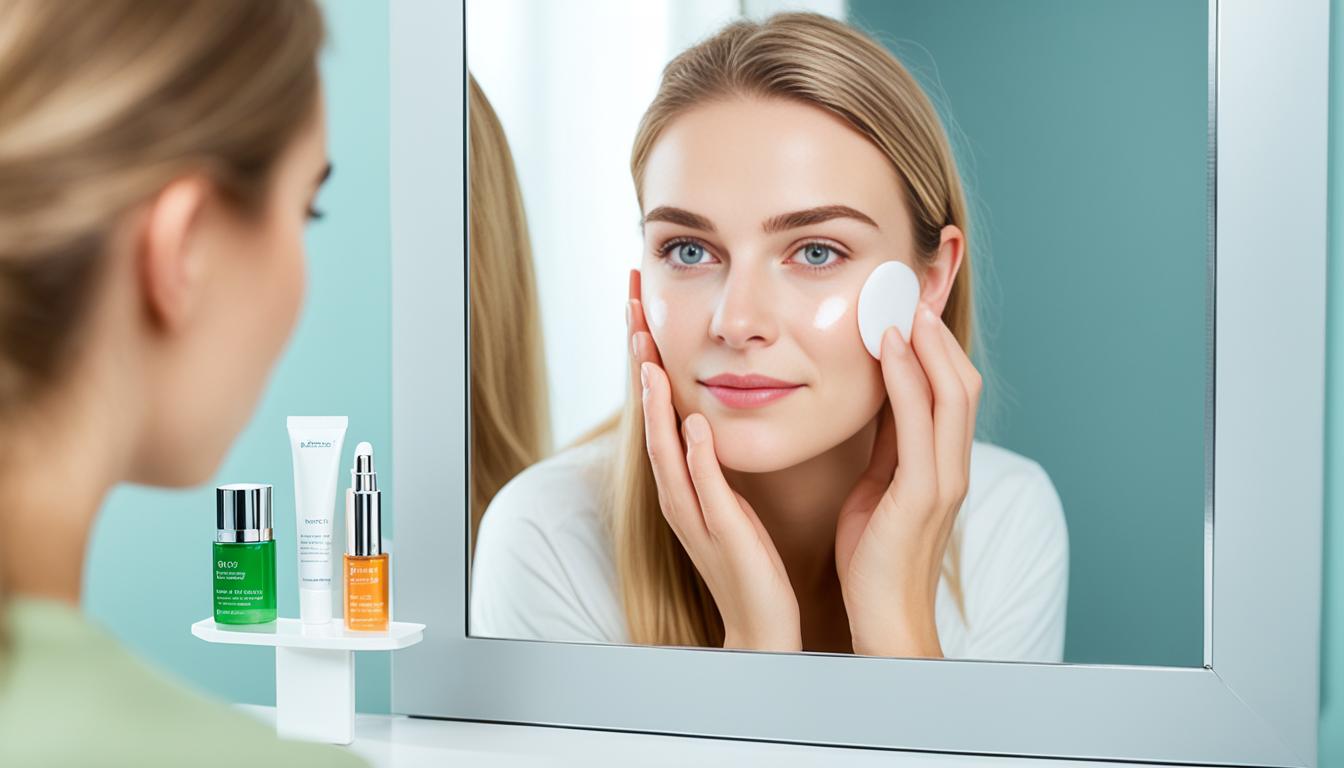Should Teens Use Retinol? Skincare Safety Tips
Retinol, a derivative of vitamin A, has gained popularity in the skincare world for its ability to boost collagen levels, maintain skin elasticity, and address blemishes and uneven pigmentation. However, when it comes to the teenage population, the question arises – should teens use retinol?
While retinol products are generally safe to use in your teens, it may not be necessary if you have healthy skin. For teenagers, it’s essential to prioritize a gentle skincare routine that includes cleanser, toner, moisturizer, and SPF. Investing in a consistent skincare regimen and consulting a dermatologist can help guide teens towards products and practices that suit their specific needs.
To shed more light on the topic, let’s explore the benefits, risks, and age-appropriate skincare tips for teens when it comes to retinol and other skincare considerations.
Key Takeaways:
- Retinol is a vitamin A derivative that can benefit teenage skin, but it may not be necessary for those with healthy skin.
- Prioritize a gentle skincare routine with cleanser, toner, moisturizer, and SPF before considering retinol for acne-prone skin.
- Consult a dermatologist before using prescription retinoids like tretinoin.
- Teenagers should focus on age-appropriate skincare routines that include cleanser, toner, moisturizer, and SPF.
- Retinol can be introduced in the early 30s to address early signs of aging and maintain a youthful complexion.
Understanding Retinol for Teenagers

Retinol is a popular skincare ingredient that offers numerous benefits for teenagers. It can help with blemishes, reduce the size of pores, and improve overall skin texture. However, it’s essential to approach retinol use with caution and consider age-appropriate skincare for adolescents.
One of the key benefits of retinol for teenagers is its ability to combat blemishes. Retinol helps to unclog pores, reduce oil production, and minimize acne breakouts. It also promotes skin cell turnover, leading to a clearer complexion and smoother skin.
Quote:
“I started using retinol in my teenage years, and it made a significant difference in my skin. My blemishes reduced, and my skin appeared brighter and more even-toned.” – Emily, 19
However, it’s important to acknowledge the potential risks associated with retinol for teenagers. The main concern is skin irritation, which can occur if retinol is used incorrectly or in high concentrations. It’s crucial to start with a low percentage retinol product and gradually increase usage to allow the skin to adjust.
Additionally, teenagers should use age-appropriate skincare products that cater to their specific needs. While retinol can be beneficial, it’s important not to neglect the basics of skincare. A gentle cleanser, toner, and moisturizer suitable for young skin are essential for maintaining a healthy complexion.
Retinol Products for Young Skin
When choosing retinol products for teenagers, it’s best to opt for over-the-counter options with lower concentrations. These products are generally milder and less likely to cause irritation. Look for retinol products specifically formulated for young or acne-prone skin.
| Product | Key Features | Recommended for |
|---|---|---|
| Brand XYZ Retinol Serum | Contains 0.3% retinol | Teenagers with acne-prone skin |
| XYZ Anti-Aging Night Cream | Combines retinol with hydrating ingredients | Teenagers concerned with early signs of aging |
| Brand ABC Retinol Moisturizer | Enriched with antioxidants for added skin nourishment | Teenagers looking for an all-in-one retinol product |
Remember, it’s essential to consult a dermatologist before incorporating retinol into your skincare routine. They can provide personalized advice and recommend the most suitable retinol products based on your specific skin concerns and needs.
Overall, understanding the benefits and risks of retinol for teenagers is crucial for maintaining healthy and age-appropriate skincare practices. With the right approach and guidance, retinol can be a valuable addition to a teenager’s skincare routine, helping to promote clear, radiant, and youthful-looking skin.
Age-Appropriate Skincare for Teens
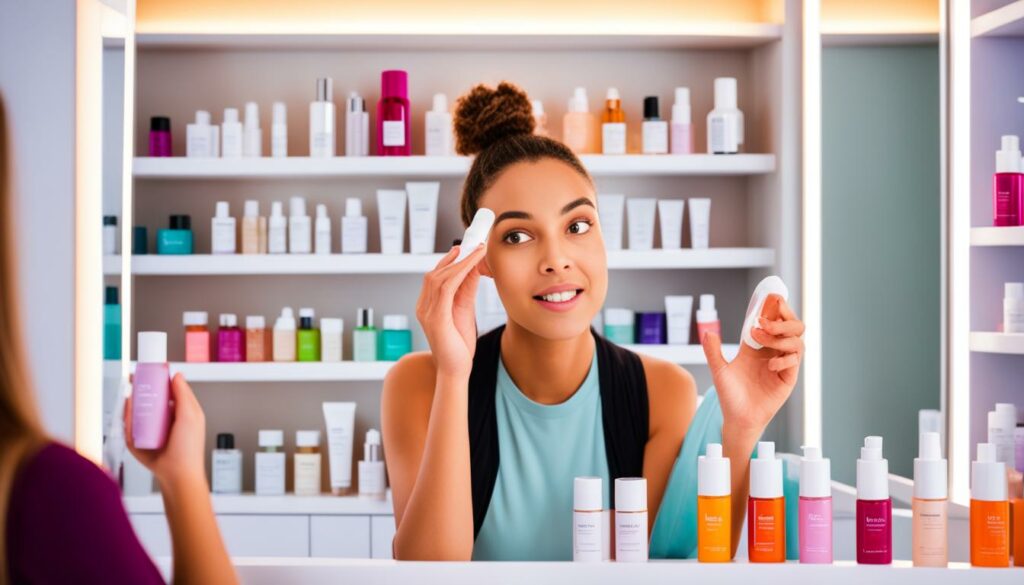
When it comes to skincare for teenagers, it’s essential to establish an age-appropriate routine that focuses on gentle and effective products. Teenage skin is often more prone to breakouts and can be sensitive, so it’s crucial to prioritize products that are suitable and safe for their specific needs. Here are some helpful tips for teenagers looking to maintain healthy and radiant skin:
Cleansing
Start your skincare routine with a gentle cleanser that is formulated for your skin type. Whether you have oily, dry, or combination skin, choose a cleanser that will effectively remove dirt, oil, and impurities without causing irritation. Avoid harsh soaps or cleansers that may strip the skin of its natural oils.
Toning
After cleansing, consider incorporating a toner into your routine. Toners can help balance the skin’s pH levels, remove any remaining traces of dirt or makeup, and prepare the skin for the next steps in your skincare regimen. Look for toners that are alcohol-free and contain soothing ingredients like witch hazel or chamomile.
Moisturizing
Hydrating your skin is essential, regardless of your skin type. Choose a moisturizer that is lightweight, non-comedogenic, and provides adequate hydration without clogging pores. Look for moisturizers that contain beneficial ingredients like hyaluronic acid or ceramides to help retain moisture and improve skin elasticity.
Sun Protection
Protecting your skin from harmful UV rays is crucial at any age. Make sure to apply a broad-spectrum sunscreen with an SPF of at least 30 every day, even on cloudy or overcast days. Sunscreen helps prevent premature aging, sunspots, and reduces the risk of skin cancer. Remember to reapply every two hours, especially if you’re spending time outdoors.
The Role of Retinol
Retinol, a derivative of vitamin A, can be beneficial for teenagers dealing with acne. It helps unclog pores, reduces inflammation, and promotes cellular turnover. However, retinol should be used under the guidance of a dermatologist, as it may cause skin irritation or dryness if not used correctly. It’s essential to start with a low concentration of retinol and gradually increase usage to allow the skin to adjust.
Consult a dermatologist before incorporating retinol into your skincare routine to ensure it is appropriate for your specific skincare concerns.
Teenage Skincare Tips Infographic
| Tips | Description |
|---|---|
| 1. | Wash your face twice daily with a gentle cleanser |
| 2. | Use oil-free and non-comedogenic products |
| 3. | Avoid picking or popping pimples to prevent scarring |
| 4. | Exfoliate once or twice a week to remove dead skin cells |
| 5. | Drink plenty of water to keep your skin hydrated |
| 6. | Get enough sleep to allow your skin to repair and rejuvenate |
| 7. | Avoid excessive sun exposure and always wear sunscreen |
| 8. | Avoid sharing makeup and skincare products to prevent bacterial infection |
Following these teenage skincare tips can help promote healthy skin and reduce the risk of breakouts, providing a solid foundation for a lifetime of good skincare habits. Remember, every individual’s skin is unique, so it’s essential to listen to your skin’s needs and consult a dermatologist for personalized advice.
Incorporating Retinol in Early 20s
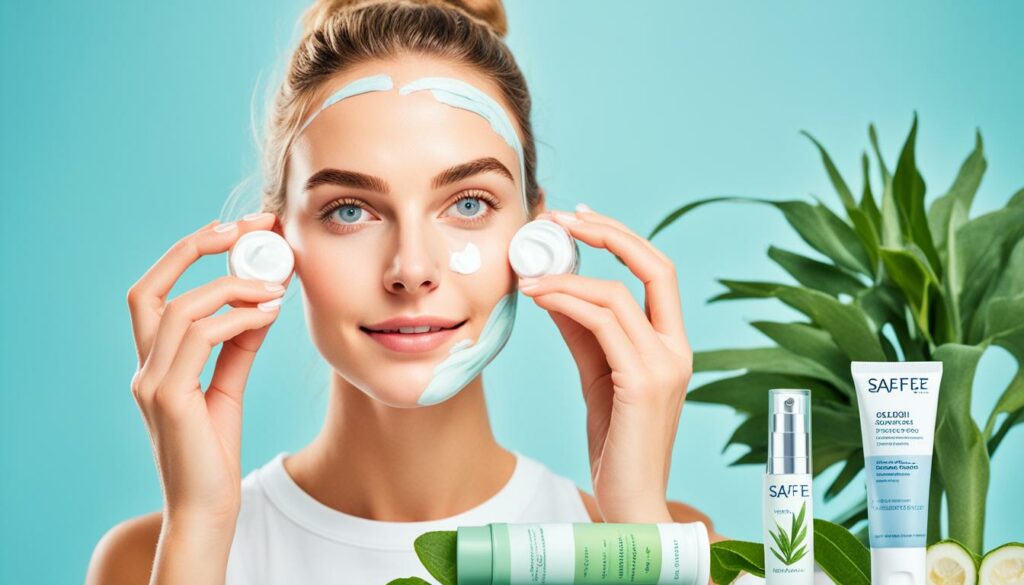
In your early 20s, your skin is at its peak level of collagen production, and blemishes are common. If you’re happy with your skin texture, you may not need to use retinol just yet. It’s more important to focus on maintaining a healthy skincare routine and protecting your skin from sun damage with SPF. If you have persistent acne or other skin concerns, consult a dermatologist for personalized advice.
During your early 20s, your skin undergoes significant changes as it reaches peak collagen production. This natural boost in collagen helps maintain skin elasticity and a youthful appearance. However, it is also a time when many individuals experience blemishes and acne breakouts.
While retinol can be beneficial for treating acne, it’s important to assess whether you truly need it at this stage. If you have relatively healthy skin and are content with your skin texture, focusing on a consistent and gentle skincare routine may be sufficient.
Instead of immediately incorporating retinol into your skincare regimen, prioritize the basics. A well-rounded routine should include cleansing, toning, moisturizing, and protecting your skin from harmful UV rays with SPF. These fundamental steps lay the foundation for healthy and radiant skin.
Remember that everyone’s skin is unique, so it’s crucial to consider your individual needs and consult a dermatologist for personalized advice. If you experience persistent acne or other skin concerns that are impacting your self-confidence, a dermatologist can provide guidance on incorporating retinol or recommending alternative treatments tailored to your specific situation.
Additionally, embracing a holistic approach to skincare involves adopting healthy lifestyle habits. These habits include staying hydrated, eating a balanced diet rich in fruits and vegetables, managing stress levels, and getting sufficient sleep. These factors can significantly contribute to the overall health and vitality of your skin.
“Taking care of your skin in your early 20s can set the stage for a lifetime of healthy and resilient skin. Prioritize a consistent routine, protect your skin from the sun, and consult a dermatologist if you have specific concerns.”
Benefits of Retinol for Teens
While retinol may not be necessary for all teens, it can offer several potential benefits. When used appropriately, retinol can:
- Help reduce acne: Retinol can effectively target acne by unclogging pores, reducing inflammation, and regulating oil production.
- Improve skin texture: By stimulating collagen production and increasing cell turnover, retinol can enhance skin smoothness and reduce the appearance of fine lines and wrinkles.
- Even out skin tone: Retinol can fade hyperpigmentation and address post-inflammatory hyperpigmentation caused by acne.
These benefits, combined with a targeted skincare routine and professional guidance, can help teens achieve clear, smooth, and healthy-looking skin.
| Benefits of Retinol for Teens | |
|---|---|
| Reduces acne | X |
| Improves skin texture | X |
| Evens out skin tone | X |
When considering retinol for teens, it’s crucial to prioritize safe and responsible usage. Retinol products should be introduced gradually, using low concentrations and under the guidance of a dermatologist to minimize potential side effects such as irritation or dryness.
By taking a proactive and informed approach to skincare, teens can navigate the world of retinol with confidence and achieve healthy, radiant skin.
Retinol for Late 20s
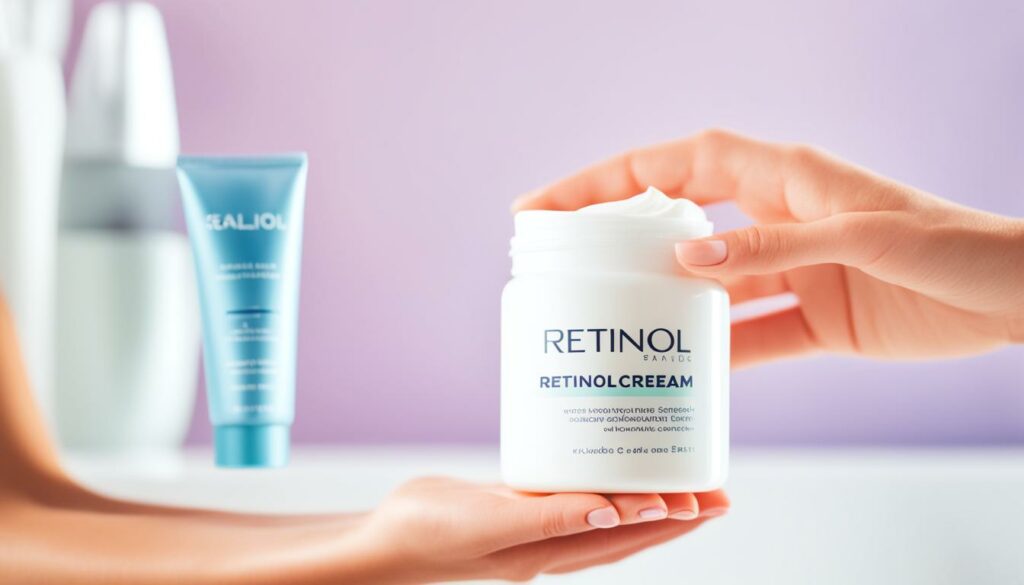
In your late 20s, your skin may start to lose minimal amounts of collagen, but it’s still firm and youthful. While you can use retinol to help with blemishes or as a preventative measure, it may not be necessary for everyone at this age. Focus on maintaining a healthy skincare routine, including a cleanser, toner, moisturizer, and SPF, to keep your skin looking and feeling its best.
Teenage Skincare Tips
As you enter your late 20s, it’s important to prioritize your skincare routine to maintain a healthy and youthful complexion. Incorporating gentle and effective skincare products can help combat early signs of aging.
- Cleanser: Use a mild, non-irritating cleanser to remove dirt, oil, and makeup from your skin.
- Toner: Follow up with a toner to balance the pH levels of your skin and remove any remaining impurities.
- Moisturizer: Hydrate your skin with a moisturizer suitable for your skin type to lock in moisture and maintain a healthy barrier.
- Sunscreen: Protect your skin from harmful UV rays by applying a broad-spectrum sunscreen with at least SPF 30 every day, even on cloudy days.
While retinol can be beneficial for some individuals in their late 20s, it’s important to consider your specific skincare needs and concerns. If you have persistent blemishes or other skin issues, consult a dermatologist for personalized advice on incorporating retinol into your skincare routine.
Pregnancy and Retinol
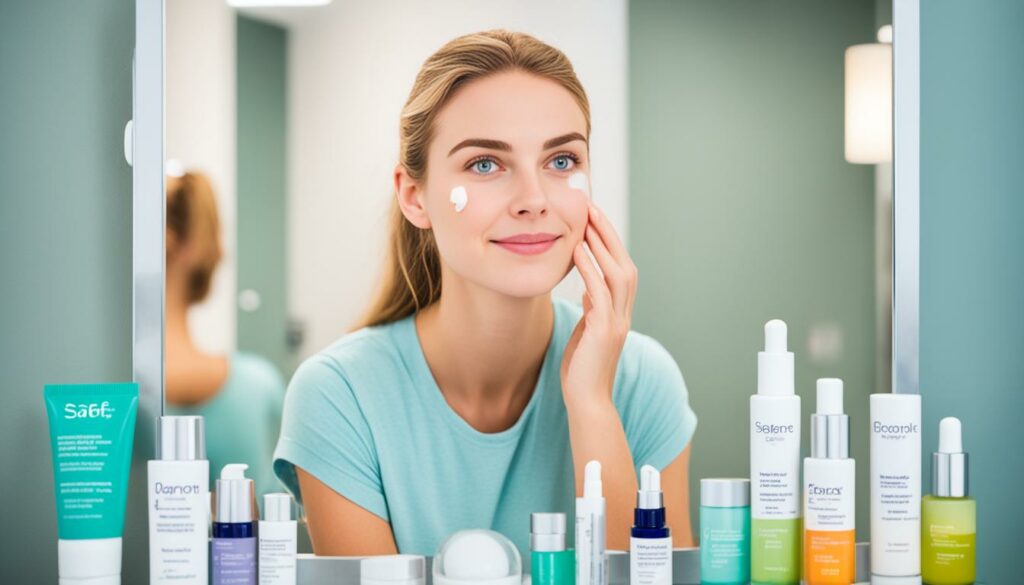
If you’re pregnant, breastfeeding, or trying to conceive, it’s important to avoid using retinol. Both oral and topical retinoids have been deemed unsafe during pregnancy, as they can increase the risk of birth defects. It’s best to consult with your doctor or dermatologist for alternative skincare options that are safe for use during pregnancy.
Consult with your doctor or dermatologist for alternative skincare options that are safe for use during pregnancy.
Incorporating Retinol in Early 30s
In your early 30s, you may start to see the first signs of aging, such as fine lines or adult breakouts. This is a good time to consider incorporating retinol into your skincare routine to address these concerns.
Retinol, a derivative of vitamin A, has been proven to promote skin renewal, reduce the appearance of wrinkles, and improve skin texture. It is an effective ingredient in addressing early signs of aging and maintaining a youthful complexion. However, it’s important to use retinol responsibly and under the guidance of a dermatologist to achieve the best results.
It’s important to note that while retinol is beneficial for the skin, excessive use or incorrect application can lead to dryness, redness, and irritation. Therefore, it’s essential to follow a proper skincare routine and gradually introduce retinol into your regimen to allow your skin to acclimate.
Here’s a suggested skincare routine for incorporating retinol in your early 30s:
- Cleanse: Start by cleansing your face with a gentle cleanser suitable for your skin type. This helps remove dirt, excess oil, and impurities from the skin.
- Tone: Follow with a toner to rebalance the skin’s pH levels and prepare it for the next steps.
- Moisturize: Apply a moisturizer that suits your skin type to hydrate and nourish the skin. Look for moisturizers that contain ingredients like hyaluronic acid or ceramides for added hydration.
- Retinol: Once your skin has acclimated to a basic skincare routine, you can incorporate retinol. Start with a low percentage over-the-counter retinol product and use it two or three times a week initially. Gradually increase the frequency of application as your skin tolerates it.
- SPF: In the morning, always finish your skincare routine with a broad-spectrum sunscreen with an SPF of at least 30. This helps protect your skin from harmful UV rays, which can contribute to premature aging.
Remember to be patient with your skincare routine and allow time for the retinol to work its magic. Consistency is key, and it’s important to maintain a healthy skincare routine even when incorporating retinol.
If you have any concerns or specific skin conditions, it’s always best to consult with a dermatologist who can provide personalized advice and recommendations tailored to your needs.
<!– Table:
| Retinoid Type | Strength | Benefits |
|---|---|---|
| Retinol | Low to moderate | Improves skin texture, reduces fine lines, and addresses early signs of aging. |
| Tretinoin | High | Prescription retinoid for severe acne and more pronounced signs of aging. Requires careful use under medical supervision. |
| Isotretinoin | High | Prescription oral retinoid used for severe acne. Can have side effects and requires close monitoring by a dermatologist. |
| Retinoic Acid | High | Prescription strength used for severe acne and more advanced signs of aging. Requires close monitoring by a dermatologist. |
–>
Benefits of Retinol for Aging Skin
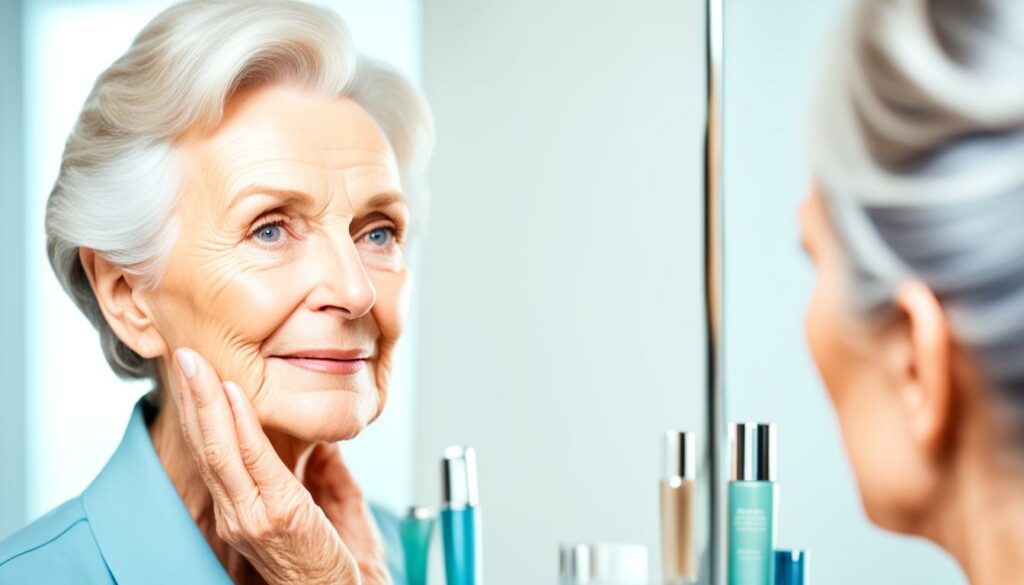
Retinol is a powerful ingredient that offers numerous benefits for aging skin. By incorporating retinol into your skincare routine, you can experience visible improvements in your skin’s texture, tone, and overall appearance.
Improved Skin Renewal: Retinol promotes cellular turnover, which helps to shed dead skin cells and reveal fresh, new skin beneath. This process leads to a smoother complexion and a more youthful glow.
Brightened Skin Tone: Retinol has the ability to fade hyperpigmentation, such as age spots and sun damage, resulting in a more even and radiant skin tone.
Increased Collagen Production: Collagen is a key protein that keeps the skin firm, plump, and elastic. Retinol stimulates collagen production, which can help to reduce the appearance of fine lines and wrinkles.
Reduced Fine Lines and Wrinkles: Retinol’s ability to boost collagen production can lead to a visible reduction in the appearance of fine lines and wrinkles, giving your skin a smoother and more youthful look.
Refined Skin Texture: Retinol helps to regulate the skin’s oil production, which can minimize the appearance of enlarged pores and refine the skin’s texture.
It’s important to note that while retinol offers these notable benefits, it should be introduced at the appropriate time and used under the guidance of a dermatologist. This is especially important for teenagers with acne-prone skin, as retinol can help address their specific skincare concerns.
To give you a visual representation of the benefits of retinol for aging skin, here’s a comparison table:
| Benefit | Description |
|---|---|
| Improved Skin Renewal | Retinol promotes cellular turnover, resulting in a smoother complexion and renewed skin. |
| Brightened Skin Tone | Retinol fades hyperpigmentation, leading to a more even and radiant skin tone. |
| Increased Collagen Production | Retinol stimulates collagen synthesis, reducing the appearance of fine lines and wrinkles. |
| Reduced Fine Lines and Wrinkles | Retinol’s collagen-boosting properties minimize the appearance of fine lines and wrinkles. |
| Refined Skin Texture | Retinol helps regulate oil production, reducing the size of pores and refining skin texture. |
As you can see, retinol offers a range of benefits that can significantly improve the appearance and health of aging skin. However, it’s essential to follow proper usage guidelines and consult with a dermatologist to ensure safe and effective incorporation into your skincare routine.
Introducing Retinol in Mid-20s or Early 30s
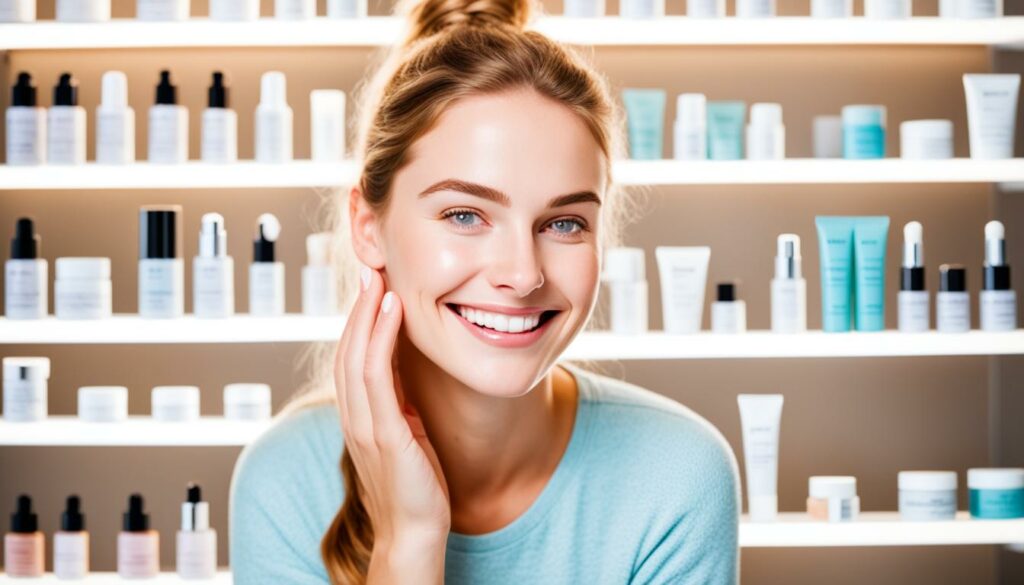
Your mid-20s or early 30s are a great time to start using retinol to address early signs of aging and maintain a youthful complexion. With its anti-aging properties, retinol can help improve the appearance of fine lines, wrinkles, and discoloration, promoting skin renewal and boosting collagen production.
When incorporating retinol into your skincare routine during this stage of life, it’s important to start slowly and gently. Begin with a low percentage over-the-counter formula and use it two times per week, gradually increasing the frequency of application. This allows your skin to acclimate to the active ingredient and reduces the risk of irritation. Remember, consistency is key when it comes to retinol.
Aside from retinol, be sure to balance your skincare practices. Exfoliation is important to remove dead skin cells and promote a smoother complexion. However, avoid using exfoliators on the same day as retinol application, as it may cause excessive sensitivity. Following retinol application with a moisturizer is crucial to maintain skin hydration and minimize potential dryness or flakiness.
Consulting a dermatologist is always recommended, especially if you have specific concerns or sensitivities. They can provide personalized advice and help you determine the best skincare routine for your needs and goals.
Remember, while retinol can be a beneficial addition to your skincare routine, it’s not a magic solution. A holistic approach to skincare, including a healthy lifestyle and consistent self-care practices, will contribute to long-term skin health and overall well-being.
Benefits of Introducing Retinol in Mid-20s or Early 30s
Introducing retinol during your mid-20s or early 30s offers several benefits:
- Reduces the appearance of fine lines and wrinkles
- Improves skin tone and texture
- Promotes collagen production
- Helps minimize discoloration and hyperpigmentation
- Enhances skin radiance and brightness
- Fights early signs of aging
As you embark on your retinol journey, remember to be patient and consistent. Ongoing, responsible use can lead to noticeable improvements in your skin’s appearance and overall health.
Retinol and Other Vitamin-A Derivatives
Retinol is a type of retinoid, which is a derivative of vitamin A. It is among the most popular ingredients in skincare products due to its numerous benefits for the skin. However, it’s important to understand that retinol is not the only form of retinoid available. There are different types of retinoids, each with its own strengths and uses.
One such retinoid is retinoic acid, which is a potent form of vitamin A used in prescription-strength skincare products. Another common retinoid is retinyl palmitate, which is often found in over-the-counter skincare products.
It is important to note that retinol, retinoic acid, and retinyl palmitate have different strengths and efficacy. While retinol is available over the counter, isotretinoin and tretinoin are prescription-strength retinoids with specific applications.
Isotretinoin
Isotretinoin is an oral retinoid that is primarily used to treat severe acne. It works by reducing oil production, decreasing the growth of acne-causing bacteria, and preventing the formation of new acne lesions.
Tretinoin
Tretinoin is a prescription-strength retinoid that is commonly used for the treatment of acne as well as the signs of aging. It helps to unclog pores, reduce inflammation, and stimulate collagen production, leading to smoother and more youthful-looking skin.
In contrast, retinol is an over-the-counter retinoid product that is more accessible to consumers. It is known for its ability to improve uneven skin tone, reduce the appearance of pigmentation, and enhance overall skin texture.
When it comes to choosing the right retinoid for your skincare needs, it’s essential to consult with a dermatologist. They can evaluate your skin type and concerns and recommend the most suitable retinoid for you.
Retinol and other retinoids can be powerful additions to your skincare routine. However, it’s important to use them responsibly and as directed to avoid potential side effects. Always follow the instructions provided with the product and start with a lower concentration to allow your skin to acclimate.
Remember, retinol is just one skincare ingredient among many. It’s crucial to maintain a well-rounded and age-appropriate skincare routine that includes gentle cleansers, moisturizers, and sun protection to keep your skin healthy and radiant.
In the next section, we will discuss the importance of gradually introducing retinol into your skincare routine and share some tips for a smooth transition.
Gradual and Gentle Introduction to Retinol
When it comes to introducing retinol into your skincare routine as a teenager, it’s crucial to start slowly and gently. Taking a gradual approach allows your skin to adjust to this potent ingredient without causing irritation. Here are some essential tips for safely incorporating retinol into your skincare regimen:
- Choose a low percentage retinol: Start with an over-the-counter retinol product that has a low concentration. This helps minimize the risk of adverse reactions and allows your skin to acclimate to this powerful ingredient.
- Apply retinol twice a week: Begin by using retinol two times per week and monitor how your skin responds. If there is no excessive dryness or irritation, you can gradually increase the frequency of application.
- Be patient: Results from retinol may take time to become visible. It’s essential to be patient and consistent with your usage. Over time, retinol can improve the appearance of acne, fine lines, and uneven skin tone.
To further ensure the safe and effective use of retinol, there are a few precautions to keep in mind. Avoid using retinol on the same day as exfoliation or in combination with certain in-office treatments. This will help prevent potential sensitivity and maximize the benefits of your skincare routine. Consulting with a dermatologist is highly recommended to receive personalized advice based on your specific skin concerns and needs.
Remember, incorporating retinol requires a gradual and gentle approach. By following these tips and seeking professional guidance, you can safely enjoy the benefits of retinol for healthy, youthful-looking skin.
| Benefits of Gradual Introsuction of Retinol: | Tips for Safe Use: |
|---|---|
| Gradually acclimates skin to retinol | Start with a low percentage retinol |
| Reduces the risk of irritation and side effects | Apply retinol twice a week initially |
| Allows skin to adjust and build tolerance | Be patient and consistent with usage |
| Minimizes dryness and flakiness | Avoid using retinol on exfoliation days |
| Maximizes the benefits of retinol | Consult with a dermatologist for personalized advice |
Conclusion
Should teens use retinol? The answer is yes, but with caution. Retinol can be a beneficial skincare ingredient for teenagers and young adults, offering solutions for blemishes and early signs of aging. However, it’s important to use retinol responsibly and under the guidance of a dermatologist.
Teenage skincare tips should prioritize age-appropriate routines that include gentle cleansers, toners, moisturizers, and SPF. These basic steps are crucial for maintaining overall skin health and preventing future damage.
While retinol may be tempting, it’s essential to seek professional advice before incorporating it into your skincare routine. Dermatologists can provide personalized guidance on proper usage and monitor any potential side effects.
In the end, the best skincare routine for teens is one that focuses on prevention and nurturing skin health. Building healthy skincare habits, along with consulting with professionals when needed, will set you on the path to long-term benefits and a healthy, glowing complexion.
FAQ
Should teens use retinol? What are the skincare safety tips?
Retinol can be beneficial for teenagers, but it should be used responsibly and under the guidance of a dermatologist. It’s important to prioritize age-appropriate skincare routines and consult a professional for personalized advice. Focus on maintaining overall skin health and adopting healthy skincare habits for long-term benefits.
What are the benefits of retinol for teenagers? Are there any risks?
Retinol can help with blemishes, reducing the size of pores, improving uneven skin tone, and addressing early signs of aging. However, it should be used with caution, as there are potential side effects. It’s essential to consult a dermatologist for personalized advice before using retinol or any other active ingredients.
Are there special retinol products for young skin? What is age-appropriate skincare for adolescents?
While there are retinol products available for young skin, it’s crucial to focus on age-appropriate skincare for adolescents. This includes a gentle cleanser, toner, moisturizer, and SPF suitable for their skin type. Avoid using harsh or irritating products and consult a dermatologist to determine the best skincare routine for teens.
When should retinol be incorporated into skincare routines in the early 20s?
In the early 20s, retinol may not be necessary for everyone if you have healthy skin. It’s more important to focus on maintaining a healthy skincare routine with cleanser, toner, moisturizer, and SPF to protect the skin. Consider retinol for acne-prone skin under the guidance of a dermatologist.
Is retinol necessary for late 20s skincare?
In your late 20s, while you can use retinol to help with blemishes or as a preventative measure, it may not be necessary for everyone. Prioritize maintaining a healthy skincare routine with cleanser, toner, moisturizer, and SPF to keep your skin looking and feeling its best.
Is it safe to use retinol during pregnancy?
It is important to avoid using retinol during pregnancy, as both oral and topical retinoids have been deemed unsafe due to the risk of birth defects. Consult with your doctor or dermatologist for alternative skincare options that are safe for use during pregnancy.
When should retinol be incorporated into skincare routines in the early 30s?
In your early 30s, it may be a good time to consider incorporating retinol into your skincare routine to address early signs of aging. However, it’s important to use retinol responsibly and under the guidance of a dermatologist. Continue prioritizing a healthy skincare routine with cleanser, toner, moisturizer, and SPF.
What are the benefits of retinol for aging skin?
Retinol is known for its anti-aging properties as it promotes skin renewal, brightens skin tone, and boosts collagen production. It can improve the appearance of fine lines, wrinkles, discoloration, and overall skin texture. However, it’s important to start using retinol at the right time and with professional guidance to avoid potential side effects.
When should retinol be introduced in the mid-20s or early 30s?
The mid-20s or early 30s is a suitable time to start using retinol to address early signs of aging and maintain a youthful complexion. Begin with a low percentage over-the-counter formula and gradually increase usage. Balance retinol use with other skincare practices, such as exfoliation, and maintain consistency in your routine. Consult a dermatologist for personalized advice.
What are the different forms of retinoids? Are they all safe for use?
Retinol is one type of retinoid, which is a derivative of vitamin A. Other forms include retinoic acid, retinyl palmitate, isotretinoin, and tretinoin. Each has varying strengths and uses. Isotretinoin is an oral retinoid used to treat acne, while tretinoin is a prescription retinoid for acne and signs of aging. It’s important to use retinoids, including retinol, responsibly and under professional guidance.
How should retinol be gradually and gently introduced to skincare routines?
When incorporating retinol, it’s important to start slowly and gently. Begin with a low percentage over-the-counter formula and use it twice a week, gradually increasing the frequency of application. This allows your skin to adjust to the active ingredient and reduces the risk of irritation. Avoid using retinol on the day before exfoliation or in conjunction with certain in-office treatments. Consult a dermatologist for personalized advice.

